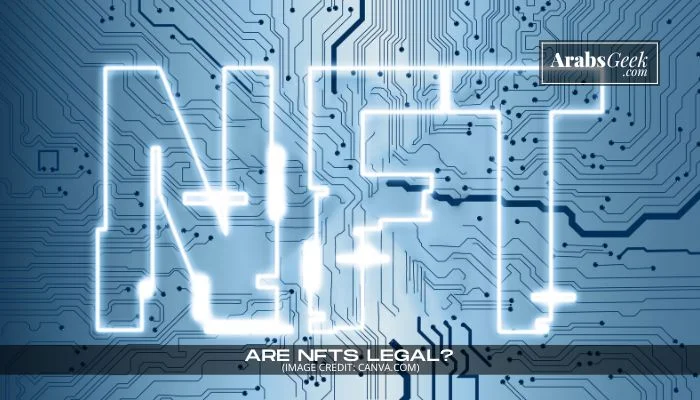In the digital age, where innovation races at breakneck speed, Non-Fungible Tokens (NFTs) have emerged as a groundbreaking phenomenon, sparking curiosity and debate in equal measure. Amidst their soaring popularity, a pressing question surfaces: Are NFTs legal? This query isn’t just a fleeting thought; it’s a significant concern for artists, collectors, investors, and legal experts alike. As we delve into the world of NFTs, the lines between digital ownership, intellectual property, and traditional legal frameworks become intriguingly blurred.
NFTs, existing in the digital ether and traded in a virtual marketplace, challenge conventional legal definitions and regulations. Understanding the legality of NFTs is crucial, not just for compliance but also for the confidence and security of everyone involved in this digital marketplace. Are we navigating uncharted legal waters, or do existing laws provide a safety net for NFT transactions? It’s a query that demands exploration, not just for clarity but also to pave the way for the responsible growth of this digital frontier.
Join us as we unravel the legal intricacies of NFTs, exploring how they fit into the existing legal landscape and what the future might hold in this rapidly evolving space.
Table of Contents
Understanding the Legal Status of NFTs | Are NFTs legal?
NFTs, standing for Non-Fungible Tokens, are a type of digital asset verified using blockchain technology, making each NFT unique and not interchangeable. The legal status of NFTs primarily revolves around their classification, ownership rights, and how they comply with existing laws.
NFTs and Intellectual Property Laws | Are NFTs legal?
- Copyright and Trademark Laws: NFTs often represent digital artwork, music, or other forms of intellectual property. When creating or buying an NFT, it’s crucial to consider copyright and trademark laws. The ownership of an NFT doesn’t necessarily grant ownership of the underlying intellectual property unless explicitly stated.
- Licensing and Usage Rights: Many NFTs come with specific licenses that define how they can be used. Understanding and adhering to these licenses is important for both creators and buyers.
- Unlock Exclusive Financial Insights! Click Over to EntrepreneursPilot.com Now!
- Unlock a Treasure Trove of Must-Read Finance Articles! Click Here to Dive into Our Homepage’s Wealth of Knowledge!
- Unlock Exclusive Business Opportunities! 🚀 Connect with Us Now at [email protected]!
Regulatory Aspects of NFT Transactions | Are NFTs legal?
- Financial Regulations: Depending on the jurisdiction, NFTs can be subject to various financial regulations, especially if they are considered securities or are involved in large transactions that might trigger anti-money laundering laws.
- Taxation: NFT transactions can have tax implications. In many countries, buying and selling NFTs are subject to capital gains tax. It’s important for participants in the NFT market to understand their tax obligations.
Consumer Protection and NFTs | Are NFTs legal?
Consumer protection laws apply to NFT transactions, especially in cases of fraud, misrepresentation, or when the NFT platforms have unfair or deceptive practices. Buyers should be aware of their rights and the recourse available to them in case of disputes.
NFTs and Contract Law | Are NFTs legal?
When you buy an NFT, you are essentially entering into a contract with the seller. The terms of the contract, often embedded in the smart contract of the NFT, dictate the rights and obligations of each party. Understanding these terms is crucial for legal protection.
Jurisdictional Challenges | Are NFTs legal?
NFTs pose jurisdictional challenges since they exist on decentralized networks and can be bought and sold globally. Determining which country’s laws apply in disputes can be complex.
The Evolving Legal Landscape | Are NFTs legal?
The legal landscape around NFTs is evolving. As NFTs become more mainstream, we can expect more clarity and legal frameworks developed specifically to address the unique aspects of NFTs and blockchain technology.
Best Practices for Navigating NFT Legality | Are NFTs legal?
- Due Diligence: Conduct thorough research before creating, buying, or selling NFTs to ensure compliance with legal requirements.
- Seek Legal Advice: Considering the complexity and evolving nature of NFTs, seeking legal advice, especially for significant transactions or unique cases, is advisable.
- Stay Informed: The legal aspects of NFTs are continually developing. Staying informed about the latest legal developments in your jurisdiction and globally is important.
The Future of NFTs and Law
As NFTs continue to grow in popularity, we can expect more legal precedents, regulations, and perhaps even new laws tailored to the digital assets market. The interaction between law and technology will play a crucial role in shaping the future of NFTs.
Conclusion | Are NFTs legal?
While NFTs are legal, their novelty and the digital landscape they inhabit present unique legal considerations. Navigating the legalities of NFTs requires a careful understanding of intellectual property, financial regulations, contract law, and the latest legal developments in this space.
FAQ Section
Q1: Can I copyright an NFT?
A: You can copyright the original work that the NFT represents, but the NFT itself, being a token on a blockchain, is typically not subject to copyright.
Q2: Are NFTs considered real assets?
A: Legally, NFTs are considered digital assets. They represent ownership of a unique digital item or token but do not equate to physical, tangible assets.
Q3: Can I resell any NFT that I purchase?
A: Generally, yes, but you should review the terms of the sale and any licenses associated with the NFT to understand your rights fully.
Q4: Is creating an NFT of someone else’s work legal?
A: Creating an NFT of someone else’s work without permission can infringe on their intellectual property rights and is generally illegal. Always obtain proper permissions or licenses for any work that is not your original creation.











